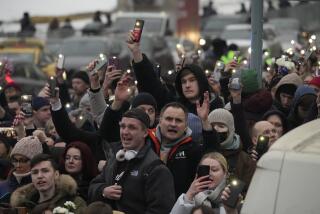Chernenko Watch Provides Kremlin Observers With Sense of Deja Vu
- Share via
MOSCOW — Almost exactly a year ago, diplomats and Western journalists did their best to keep a death watch on Soviet President Yuri V. Andropov, who had been out of sight for almost six months but was officially described as suffering only from a cold.
When Andropov died Feb. 9, the first indications of his passing came from an unusual number of lights burning all night at the headquarters of the KGB security police, along with solemn music on the 24-hour radio station. Public announcement of his death did not come until the following morning.
This winter, Kremlin history seems to be repeating itself, at least in part. Reports and rumors on the precarious health of President Konstantin U. Chernenko have put Moscow observers on high alert again.
Soviet officials have acknowledged to Western diplomats only that Chernenko was too ill to attend a meeting of Warsaw Pact leaders that had been scheduled for mid-January. Considering his history of apparent emphysema and Moscow’s subzero temperatures, the 73-year-old Soviet leader presumably is in a hospital where his condition can be closely monitored.
Leaders lingering for years despite ill health are not a new phenomenon here. V.I. Lenin suffered a stroke in May, 1922, and never fully recovered before his death on Jan. 21, 1924. More recently, President Leonid I. Brezhnev was seriously ill for several years before his death Nov. 10, 1982. In contrast to Andropov, however, Brezhnev kept making public appearances until three days before he died.
Since traditional Kremlin secrecy rules out any official report on a leader’s physical condition, diplomats and reporters are left to scrutinize unconventional signals.
As a result, ears are again attuned for somber music on Mayak (Lighthouse), the Soviets’ round-the-clock radio station that normally plays a lot of rock and popular music.
“The hard rock goes first but it may take three or four hours of listening to confirm a trend,” said one veteran observer of Kremlin death cues.
Another tip may be the sudden replacement of a light program on television, such as a circus performance or musical comedy, with a more serious or patriotic show.
Television announcers wearing dark clothing, suitable for mourning, sometimes has been an early warning signal but it can be misleading, since announcers’ wardrobes are usually subdued.
Travel of Politburo members far away from Moscow, on the other hand, is regarded as a reassuring sign, since it indicates that they have little concern about missing a succession struggle that would result from a leader’s death.
Even the Hall of Columns, a stately former ballroom where Kremlin leaders lie in state, can be checked regularly to see whether workers are hanging crepe over the chandeliers.
In fact, an attendant at the hall inadvertently gave out the word that Defense Minister Dmitri F. Ustinov had died last December, seven hours before the formal announcement was made on Soviet television.
Kremlin-watching is hardly a science, however, and signals can be misread. Last week, when solemn classical music came over the radio one morning, news agencies prepared for action. They quickly learned, however, that the music commemorated the 61st anniversary of the death of Lenin.
There will be better indications of Chernenko’s health later this month. If he does not meet Greek Prime Minister Andreas Papandreou on a scheduled visit to Moscow on Feb. 9-11, that would indicate a serious problem.
In addition, as a nominee to the Supreme Soviet of the Russian Republic, Chernenko is expected to meet with his constituents before the Feb. 24 election. Like all Soviet citizens, he is also expected to show up at his polling place and vote. If he does neither, that would be additional evidence that he is too ill to go out in public.
Soviet citizens have not even been told that Chernenko is ill, and many must wonder why he has dropped out of of sight recently.
The president was last seen on the main evening news program Dec. 27, presenting medals to a group of writers. At that time, he was extremely short of breath, virtually gasping for air after every second or third word.
“People think of him as an old grandfather who never leaves the house, anyway,” one middle-aged Muscovite said.
Even so, Chernenko has remained in the headlines through a steady stream of messages, letters and other statements in the government-controlled press.
On Thursday, he submitted written responses to questions from Cable News Network. A spokesman said Chernenko would have liked to appear personally “but at present he is on vacation.”
While all this may be designed to reassure the public, it reminds the diplomats and journalists of similar statments issued in Andropov’s name almost up to the day he died. Said one Western diplomat, “There’s some feeling of deja vu .”
More to Read
Sign up for Essential California
The most important California stories and recommendations in your inbox every morning.
You may occasionally receive promotional content from the Los Angeles Times.













